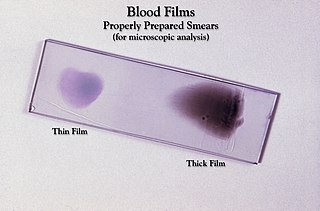Related Research Articles

Pathology is the study of disease and injury. The word pathology also refers to the study of disease in general, incorporating a wide range of biology research fields and medical practices. However, when used in the context of modern medical treatment, the term is often used in a narrower fashion to refer to processes and tests that fall within the contemporary medical field of "general pathology", an area that includes a number of distinct but inter-related medical specialties that diagnose disease, mostly through analysis of tissue and human cell samples. Idiomatically, "a pathology" may also refer to the predicted or actual progression of particular diseases, and the affix pathy is sometimes used to indicate a state of disease in cases of both physical ailment and psychological conditions. A physician practicing pathology is called a pathologist.

Anatomical pathology (Commonwealth) or anatomic pathology (U.S.) is a medical specialty that is concerned with the diagnosis of disease based on the macroscopic, microscopic, biochemical, immunologic and molecular examination of organs and tissues. Over the 20th century, surgical pathology has evolved tremendously: from historical examination of whole bodies (autopsy) to a more modernized practice, centered on the diagnosis and prognosis of cancer to guide treatment decision-making in oncology. Its modern founder was the Italian scientist Giovan Battista Morgagni from Forlì.
Hematology is the branch of medicine concerned with the study of the cause, prognosis, treatment, and prevention of diseases related to blood. It involves treating diseases that affect the production of blood and its components, such as blood cells, hemoglobin, blood proteins, bone marrow, platelets, blood vessels, spleen, and the mechanism of coagulation. Such diseases might include hemophilia, sickle cell anemia, blood clots (thrombus), other bleeding disorders, and blood cancers such as leukemia, multiple myeloma, and lymphoma. The laboratory analysis of blood is frequently performed by a medical technologist or medical laboratory scientist.

Forensic pathology is pathology that focuses on determining the cause of death by examining a corpse. A post mortem examination is performed by a medical examiner or forensic pathologist, usually during the investigation of criminal law cases and civil law cases in some jurisdictions. Coroners and medical examiners are also frequently asked to confirm the identity of remains.
Dermatology is the branch of medicine dealing with the skin. It is a speciality with both medical and surgical aspects. A dermatologist is a specialist medical doctor who manages diseases related to skin, hair, nails, and some cosmetic problems.
Transfusion medicine is the branch of medicine that encompasses all aspects of the transfusion of blood and blood components including aspects related to hemovigilance. It includes issues of blood donation, immunohematology and other laboratory testing for transfusion-transmitted diseases, management and monitoring of clinical transfusion practices, patient blood management, therapeutic apheresis, stem cell collections, cellular therapy, and coagulation. Laboratory management and understanding of state and federal regulations related to blood products are also a large part of the field.

Pulmonology, pneumology or pneumonology is a medical specialty that deals with diseases involving the respiratory tract. It is also known as respirology, respiratory medicine, or chest medicine in some countries and areas.

The medical examiner is an appointed official in some American jurisdictions who is trained in pathology that investigates deaths that occur under unusual or suspicious circumstances, to perform post-mortem examinations, and in some jurisdictions to initiate inquests.
Dermatopathology is a joint subspecialty of dermatology and pathology or surgical pathology that focuses on the study of cutaneous diseases at a microscopic and molecular level. It also encompasses analyses of the potential causes of skin diseases at a basic level. Dermatopathologists work in close association with clinical dermatologists, with many possessing further clinical training in dermatology.

Neuropathology is the study of disease of nervous system tissue, usually in the form of either small surgical biopsies or whole-body autopsies. Neuropathologists usually work in a department of anatomic pathology, but work closely with the clinical disciplines of neurology, and neurosurgery, which often depend on neuropathology for a diagnosis. Neuropathology also relates to forensic pathology because brain disease or brain injury can be related to cause of death. Neuropathology should not be confused with neuropathy, which refers to disorders of the nerves themselves rather than the tissues. In neuropathology, the branches of the specializations of nervous system as well as the tissues come together into one field of study.

Clinical pathology is a medical specialty that is concerned with the diagnosis of disease based on the laboratory analysis of bodily fluids, such as blood, urine, and tissue homogenates or extracts using the tools of chemistry, microbiology, hematology, molecular pathology, and Immunohaematology. This specialty requires a medical residency.
A fellowship is the period of medical training, in the United States and Canada, that a physician, dentist, or veterinarian may undertake after completing a specialty training program (residency). During this time, the physician is known as a fellow. Fellows are capable of acting as an attending physician or a consultant physician in the specialist field in which they were trained, such as internal medicine or pediatrics. After completing a fellowship in the relevant sub-specialty, the physician is permitted to practice without direct supervision by other physicians in that sub-specialty, such as cardiology or oncology.
Geriatric psychiatry, also known as geropsychiatry, psychogeriatrics or psychiatry of old age, is a branch of medicine and a subspecialty of psychiatry dealing with the study, prevention, and treatment of neurodegenerative, cognitive impairment, and mental disorders in people of old age. Geriatric psychiatry as a subspecialty has significant overlap with the specialties of geriatric medicine, behavioural neurology, neuropsychiatry, neurology, and general psychiatry. Geriatric psychiatry has become an official subspecialty of psychiatry with a defined curriculum of study and core competencies.
For the Irish playwright and screenwriter, see Nancy Harris.
A pathologists’ assistant (PA) is a physician extender whose expertise lies in gross examination of surgical specimens as well as performing forensic, medicolegal, and hospital autopsies.

Elaine Sarkin Jaffe is a senior National Cancer Institute (NCI) investigator at the National Institutes of Health (NIH) most well known for her contribution to hematopathology. She completed her medical education at Cornell University and the University of Pennsylvania, receiving her M.D. degree from University of Pennsylvania in 1969. After an internship at Georgetown University she joined NCI as a resident in anatomic pathology, and has been a senior investigator since 1974, focusing on the classification and definition of lymphomas. Jaffe's early work helped to provide a deeper understanding of the origin of lymphomas, especially follicular lymphoma. Her team notably elucidated the difference between T cell and B cell lymphomas.
Lynne V. Abruzzo is an American science researcher. As of 2017, she was at Ohio State University and an elected fellow of the American Association for the Advancement of Science.
The American Board of Pathology (ABPath) is one of 24 member boards of the American Board of Medical Specialties. This organization was assembled in May 1936, under the approval of the Advisory Board for Medical Specialties (ABMS) and the American Medical Association (AMA) Council on Medical Education and Hospitals. It is the duty of the ABPath to grant certification in Anatomic Pathology, Clinical Pathology and/or Anatomic/Neuropathology to qualified Doctors of Medicine and Doctors of Osteopathic Medicine (M.D./D.O.).
Jon Christopher Aster is an American pathologist who researches the role of the notch signaling pathway in leukemia. He is the Michael Gimbrone Professor of Pathology at Harvard Medical School. He has been a co-editor of the Annual Review of Pathology: Mechanisms of Disease since 2016.
James R. Downing is an American clinical executive. He is the president and chief executive officer of St. Jude Children's Research Hospital.
References
- ↑ "Hematology". Johns Hopkins Medicine. Retrieved 2 April 2018.
- ↑ "Hematopathology". UPMC. Retrieved 2 April 2018.
- ↑ "Flow Cytometry and Hematopathology". University of Rochester Medical Center. Retrieved 4 October 2020.